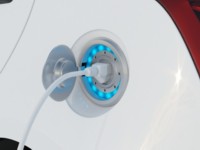Will 2012 be the Year of the Electric Car?

The Vancouver Electric Vehicle Association has declared 2012 the “Year of the Electric Car” for British Columbians.
It’s been five years since commercial automakers announced their plans for mass production of all-electric vehicles; essential charging infrastructure and first commercial deliveries have now followed.
“Leading automakers now have exceptional quality electric vehicles in BC showrooms, readily available to the driving public” said John Stonier, VEVA spokesperson.
“Recent government initiatives have put subsidies and support in place to make the vehicles more affordable than ever.”. VEVA predicts prices will drop as competition for this fastest growing market segment picks up. Exciting developments in battery technology will offer significant range increases at lower cost.
“In 2012 British Columbia will see more electric cars used by consumers, businesses and governments,” Stonier added. “Public charge stations will become more common at the workplace, tourist destinations, restaurants, hotels, but most importantly people will charge from home. We expect the adoption of electric vehicles to far exceed pundits’ predictions, just as the adoption of hybrid vehicles surpassed expectations during the last decade.”
2012 is also the 100th anniversary of VEVA’s historic 1912 Detroit Electric car. The elegant centenarian is VEVA’s electric car ambassador, its original condition road-worthiness demonstrating the durability and robustness of electric drive technology. In October, the association will mark 100 years that this classic example of historical craftsmanship and electric mobility rolled off the assembly line.
The 1912 Detroit Electric car has been in BC continuously since 1913 when Vancouver was filled with electric cars and trucks. VEVA now predicts that 2012 will see the return to that clean, low-pollution means of transportation as the norm here on Canada’s west coast.
Already, Vancouver is one of the world’s leading jurisdictions for adoption of building codes that mandate electric charging outlets in all new single family homes, and in 20% of all parking stalls in new condominiums. And provincial government initiatives are paying off, with policies and subsidies supporting adoption of all-electric automobiles.
“Vancouver is truly a pace-setter, and many other jurisdictions are using our building by-laws as a standard for their own initiatives” said Don Chandler, VEVA’s government relations chair.
“More recently, the Province of BC has supported EV’s with a $17M set of initiatives enabling the delivery of more than 35 plug-in vehicles in the first three weeks of the program that began December 1st, 2011” continued Chandler.
The BC initiative provides $5,000 consumer rebates for all-electric cars and also $500 to offset the installation of charge station equipment for garages and parkades, as well as incentives for retiring cars 1995 and older.
According to VEVA over the last decade BC has led the country in the adoption of hybrid vehicles at a rate twice the national average, and drivers have learned the benefits and durability of electric drive systems. Now with all electric cars, even greater operating benefits are possible with BC’s world low prices for electricity and cleanest GHG footprint.
In time, every consumer will enjoy and afford to be part of the revolutionary experience what VEVA has dubbed “the ‘4E’s of electric cars”. “BC drivers are concerned about environment, energy, economics, and driver experience. Electric cars deliver on all four,” explained Stonier.
Environmentally, the reduction of GHGs, especially utilizing BC’s clean hydro generated grid is significant, and the improvement in urban air quality will help reduce rising health issues associated with engine emissions and particulates from conventional vehicles.
A little know fact about electric cars and Energy is that their adoption will actually reduce overall electricity consumption. The amount of electricity required to refine and distribute gasoline actually exceeds the amount of electricity used directly to drive electric cars an equivalent distance. Oil refineries are massive electric energy consumers, and our reliance on heavy bitumen oil sands for fuel makes these numbers even worse.
Economically, prices for the initial runs of electric cars are higher at the moment, but they still offer substantially reduced operating costs, and one particular, significant difference to conventional cars. Total lifetime costs of ownership are projected to be significantly lower than conventional cars.
As electric technology is much more durable, electric cars will last three to five times longer than internal combustion cars. Depreciation, one of the greatest costs of car ownership, is dramatically reduced as there is no appreciable increase in repair liabilities as the car goes into its second and subsequent decades of service.
VEVA foresees increased production, competition and pending improvements to battery technology will bring electric car prices down within the next decade, while at the same time driving range will be increased.
The driver Experience of electric cars is probably the most attractive to discerning drivers. The clatter and vibration of engines is replaced by a smooth, silent and vibration free motor that provides unmatchable acceleration performance in everyday driving.
Most new electric car drivers see this as one of the most compelling reasons to keep buying electric cars in the future. “It’s one of those things that you can never go back once you’ve driven electric” Chandler stated
You can return to the main Market News page, or press the Back button on your browser.

